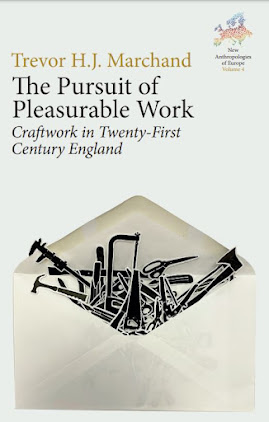The Pursuit of Pleasurable Work
Trevor H.J. Marchand, Professor of Social Anthropology, SOAS
 |
| https://www.berghahnbooks.com/title/MarchandPursuit |
After
studying and practicing architecture in Montreal, Ahmedabad and London, I came
to social anthropology to gain deeper understanding of the ways that buildings
and objects are physically crafted by hand and with natural materials. For
nearly three decades now, my anthropological research and publications have
focused almost exclusively on craftspeople, apprenticeship and skill learning. During
fieldwork, I participate directly as an apprentice and labourer in the craft I
am studying, whether it is minaret building in Yemen, mud-brick masonry in
Mali, or fine woodworking and furniture making in London’s East End. This blog
briefly introduces the background to the latter study and the resulting book, The Pursuit of Pleasurable Work: Craftwork
in Twenty-First Century England (Berghahn, November 2021).
My study of woodworking and furniture making was carried out at the celebrated Building Crafts College where I enrolled as a fulltime trainee for two years (2005–2007), and where I returned again to conduct a second study of skill learning and hands-on problem solving at the workbench (2012–2013). In addition to researching “from the inside” as a practicing member of the community, I also recorded formal interviews with fellow trainees, instructors and renowned furniture makers across England, and did archival research in the City of London at the Carpenters’ Company Livery Hall, and in university libraries and digital archives.
 |
| Marchand woodworking at the Building Crafts College, 2007 |
In brief, the book is about the quest for a better way of living. Against the backdrop of an alienating, technologizing and ever-accelerating world of production, The Pursuit of Pleasurable Work tells an intimate story: one about a community of fine woodworkers and furniture makers training at an historic institution in London’s East End during the present “renaissance of craftsmanship.” It is an animated and scholarly account of individual and shared learning experiences, trials, achievements and utopian aspirations that reveal the deep-seated human desire to create with our hands, the persistent longing to find meaningful work, and the struggle to realise dreams. The chapters offer penetrating insights into the rich socio-political history of craftwork in England; the nature of embodied skill and problem solving in design and making; the inextricable connections between our brains, hands and tools; and strategies for reconfiguring skilled practice as we age. In combination, my discoveries and the journeys of my fellow woodworkers speak volumes to the vast field of contemporary craft, as well as to craft’s past and its possible futures in a troubled world.
At the core of the book is a powerful retort to the dehumanising trend of deskilling in the classroom and the workplace. My goal as both scholar and craftsman is to promote not only a global appreciation for the dexterity, creativity and intelligence that lay at the heart of craftwork, but also a progressive revaluation of handwork as a vehicle for individual fulfilment and wellbeing. The book is a manifesto for conferring greater status on craft and for making hands-on learning integral to a rounded education that nurtures muscles, morals and mind. After all, it is with hands and bodies, and not merely words, that we humans communicate, interpret, improvise and negotiate – in a word, craft – our ways of knowing and living in the world.
Trevor H. J. Marchand is Emeritus Professor of Social Anthropology at SOAS, University of London, and recipient of the Royal Anthropological Institute’s Rivers Memorial Medal. He studied architecture (McGill), received a PhD in anthropology (SOAS), and qualified as a fine woodworker at London’s Building Crafts College. Marchand has conducted fieldwork with craftspeople around the world and published extensively, including the books Minaret Building and Apprenticeship in Yemen (2001), multi-award-winning The Masons of Djenné (2009), and Craftwork as Problem Solving (2016). He is an honorary member of the European Federation for Architectural Heritage Skills (FEMP), a College of Fellows Lecturer for Architectural Preservation Technology International (APTi), Trustee of the Paul Oliver Vernacular Architecture Library (POVAL) at Oxford Brookes, and an advisor to ICOMOS and member of its World Heritage Panel.


Comments
Post a Comment